‘It’s embarrassing we haven’t won since’: Scotland’s 1999 Five Nations victory relived
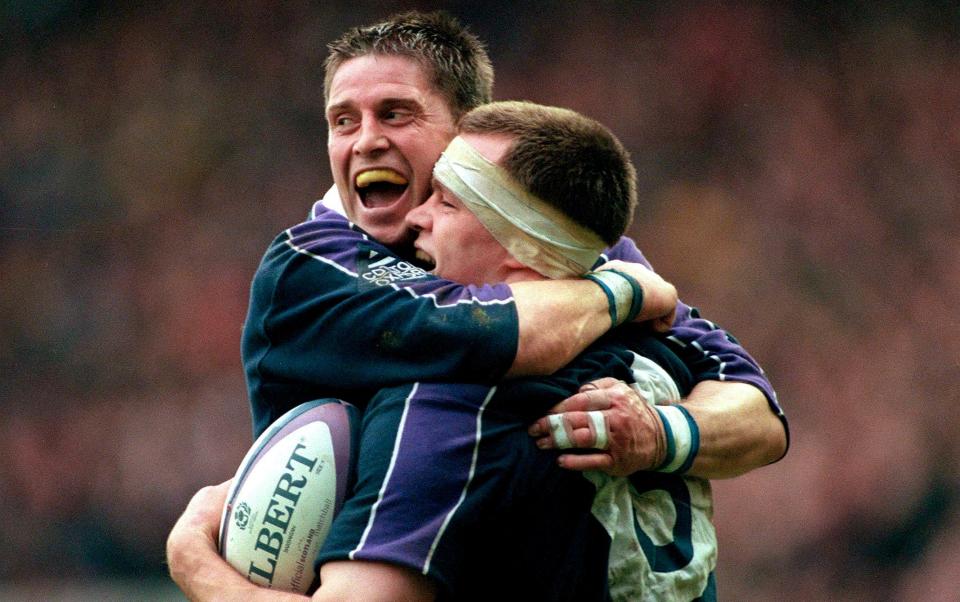
This year, the grand old championship which now goes by the name of the Six Nations celebrates the 25th anniversary of two milestones. In 1999, the year of Toy Story 2 and the introduction of the Euro, the tournament featured five sides for the final time, with Italy joining for the first instalment of the new millennium; and – look away now if you live north of Berwick-upon-Tweed – it was the last time that Scotland enjoyed a championship victory.
A loss at Twickenham ended any Grand Slam hopes, but under the gnarly eyes of Jim Telfer – Sir Ian McGeechan’s assistant for the Lions’ iconic victory in South Africa in 1997 – Scotland earned their first championship title in nine years and only their fifth of the Five Nations era. They have not won one since but with Gary Armstrong as captain and a host of star names (two of whom, sadly, are no longer with us) Scotland made history.
After victory in Paris in the final round, Telfer’s side were left to sweat on England’s match with Wales the following day, which that year was played at Wembley owing to the Millennium Stadium’s construction. Despite it being a Wales “home” match, England, going for a Grand Slam of their own, were overwhelming favourites, but came a cropper thanks to a barnstorming late try by Welsh centre Scott Gibbs. That score handed the title to Scotland on points difference, but no one could say it was not deserved; Scotland scored 16 tries – double the next best (England) – and Gregor Townsend, the current head coach, became only the fifth player in history to score a try against every other country in one championship.
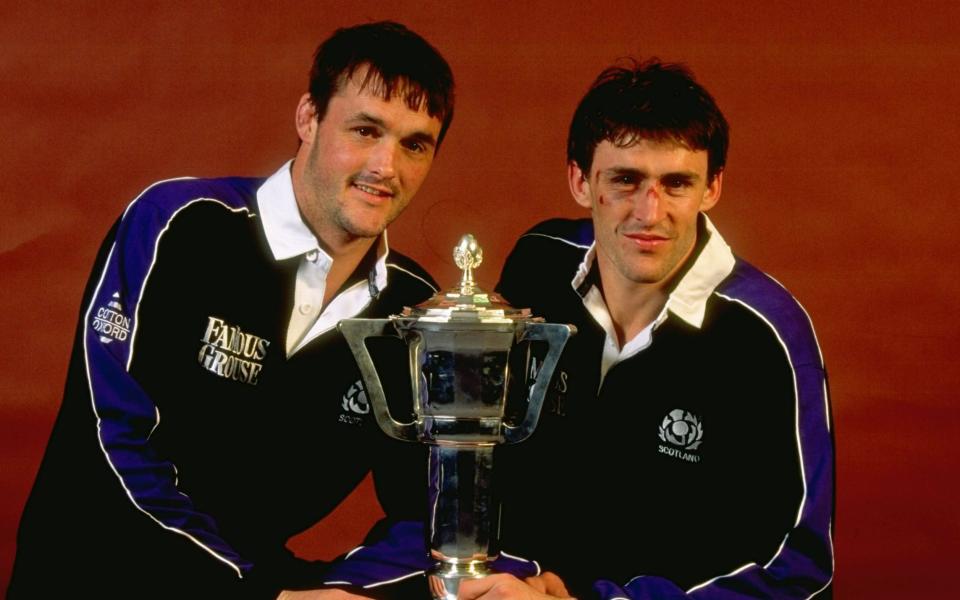
Fast forward 25 years and Townsend hopes to break the 25-year hoodoo with his crop of Scots which has been heralded as a golden generation. It all begins with Wales on Saturday, just as it did in 1999. Townsend, alongside wing Kenny Logan, prop Paul Burnell and centre John Leslie, tell the story of Scotland’s last day in the sun, starting with that victory over Wales at Murrayfield – and a try which has gone down in championship folklore, with Leslie scoring one of the quickest in Test history, after just 10 seconds.
Leslie: I turned up from New Zealand at the end of 1998 and was straight into the 1999 Five Nations. My father’s parents were both Scottish: his mother was from Ibrox and his father Linlithgow. Winning the championship was a highlight of my rugby career; the scale and tradition of the tournament, the noise, the build-up. I still tell my Kiwi mates about how good the Six Nations championship is.
Townsend: That season was my first with Brive and the November Tests hadn’t gone too well. I felt that I could potentially be out of the loop for the Five Nations. There hadn’t been much contact and one of the coaches – I think it was John Rutherford, backs’ coach – came to watch the game against Racing 92 in December and was subsequently interviewed afterwards. He said that they were looking at me not just as a 10, where I was playing for Brive, but also as a 13 and a 15. I was disappointed with that because I felt 10 was my best position. Playing there more regularly was one of the reasons I went to France. Scotland had some very good centres in Alan Tait and John Leslie, who had just come onto the scene.
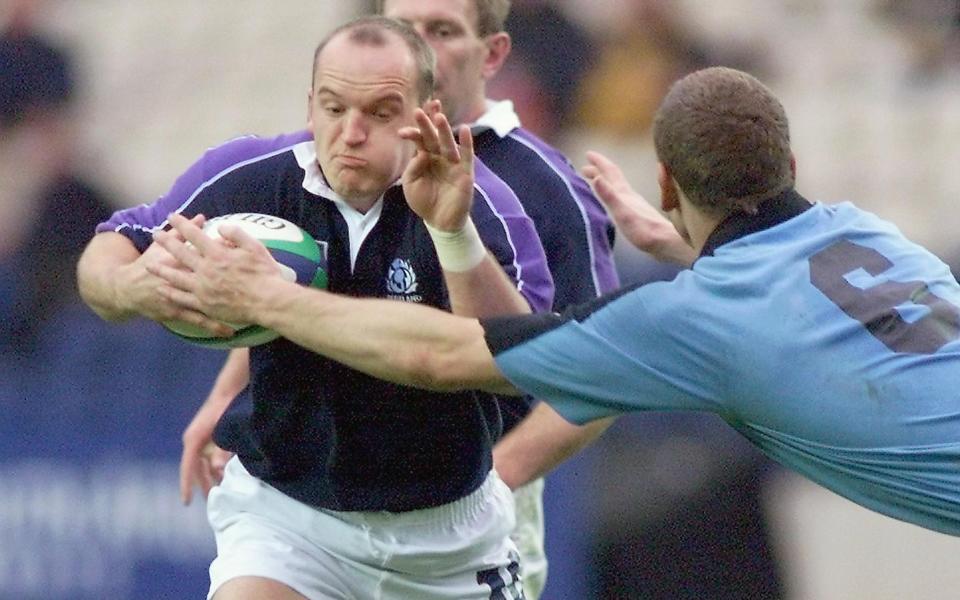
As it happened, I was selected at centre ahead of Taity for the first game. I’d been in form in France, but it wasn’t Test-level form and I didn’t really feel that much confidence or security in my place in the Scotland team going into the championship. I started that first game at 13 until Duncan Hodge broke his leg, but we really seemed to click as a midfield. I loved inside centres like John that were noisy and wanted to carry the ball. Taity at 13 read off us so well and his support lines were brilliant. It was the momentum of that first win and our connection as a midfield that got us going.
Logan: John scoring off the kick-off summed up our year; it summed up how we played. We just went for it. It’s a bit like how Scotland play now. Up until 1999 we were struggling to score tries and we weren’t hugely adventurous. After 1999, we also struggled to score tries. But we had a great back division that year.
JL: Jim Telfer orchestrated the switch-kick. He told me they were going to hit the kick-off to me and I was going to catch it. We practised it multiple times that week and it didn’t quite work and I said to Jim: ‘Are you sure?’ He said he was, before mumbling something about tricking the Welsh. But then it came off on the day! It was his plan. It was just in the moment and one of those great things that worked. That was back in the day when you didn’t bounce around after scoring tries, and as I jogged back I was still feeling the early-match nerves.
Burnell: John was such an intuitive player that if someone was going to take the opportunity, it would be him. He had such a great rugby brain. You gave him half a yard and he would be through. No one expected that try but it gave us momentum.
Scotland cruised to a 33-20 win, scoring four tries in the process. Next, however, Telfer’s side would see their Grand Slam hopes dashed by the auld enemy, England, in a tight Calcutta Cup clash. Scotland’s wait for a first victory at Twickenham since 1983 would be continued, with the hoodoo finally broken in 2021.
KL: We lost to England by three points and I missed three kicks – that always haunts you, because we should have won the Grand Slam. I just had one of those days where it didn’t really happen. I was annoyed because they were kicks I would normally get. I do look back and think: ‘One of those kicks would have been a Grand Slam.’ We were far better than them that day.
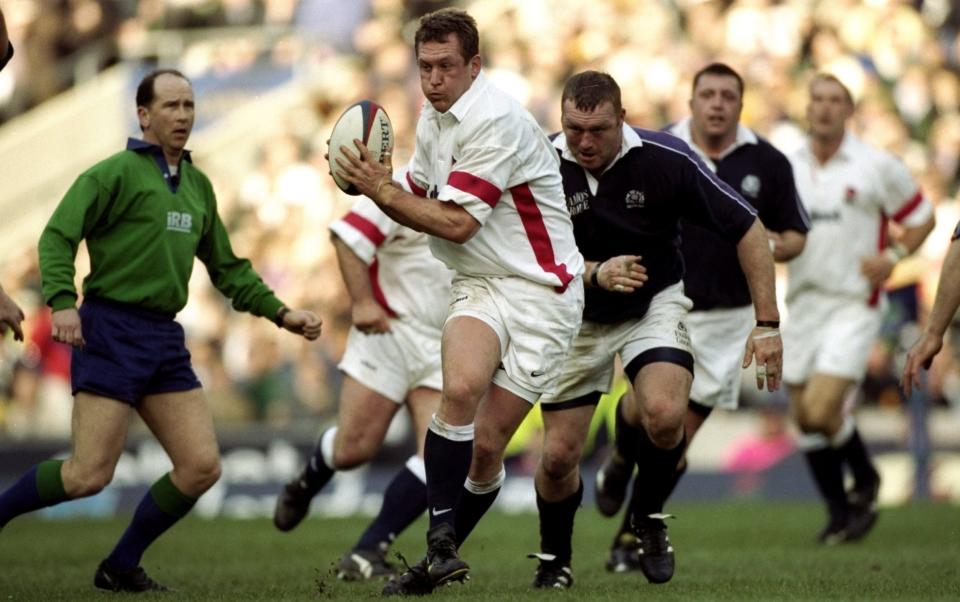
PB: Yep, we should have beaten England at Twickenham that year. It was a group of players who had been together for a few years and any side who had Jim as coach was always going to be competitive. There were world-class players throughout, too.
After the 24-21 loss at Twickenham, Scotland brushed aside an Ireland team, relatively speaking, undergoing a period in the international rugby wilderness. For Scotland, all roads led to Paris; an inaugural match at the newly completed Stade de France and a chance to give themselves an outside shot at the title. When they took it, winning 36-22, a nervous wait followed until Gibbs’ heroics a day later.
KL: Ahead of France, we were really buoyant because we had only lost narrowly at Twickenham. We knew it was one that we had let slip. The way we played the game in Paris showed that we had the belief. We ran everything. It was bizarre because it was Jim Telfer who said that! ‘We’re not going to kick it, we’re going to run it all the time – everywhere. We’re going to keep them guessing.’ So we were running it from our own tryline! It felt good. We didn’t really think about it, we just enjoyed it.
JL: The France game was fantastic but, once again, a lot of the credit has to go to Jim for giving us confidence, clarity and belief. He was instrumental.
GT: Paris is most vivid, from the start when they were all over us to our purple patch of everyone in the zone with a sense of what each other were going to do – matched by ambition and skill. We ran in five tries and we could have run in another two or three. At half time, the coaches were probably more excited than the players. Second half, we defended well. There was a natural energy drop after the way the first had played out. But we were determined to win.
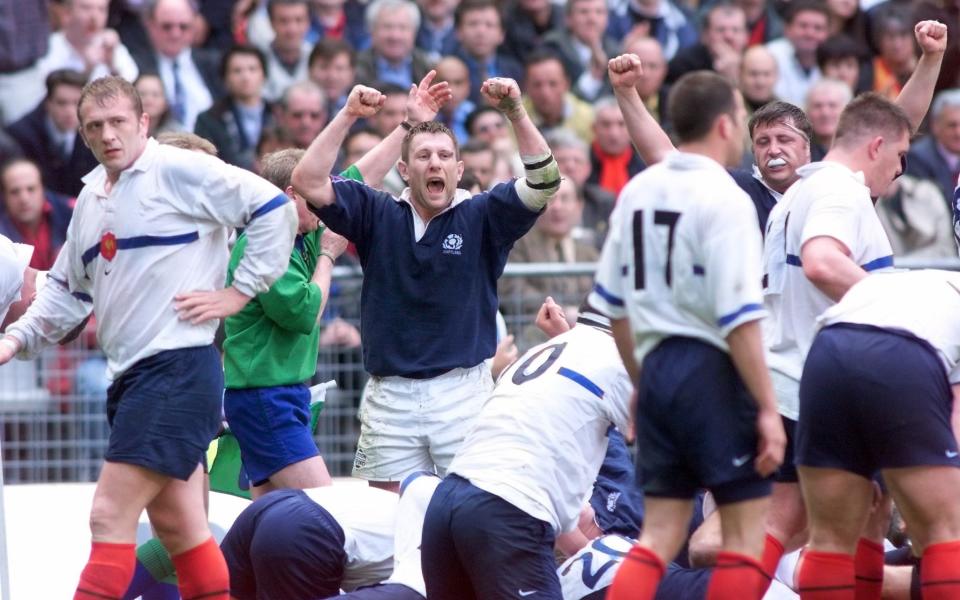
We had a big night in Paris and I had to get a train back to Brive because we had a midweek cup game. Stuart Grimes and his wife were taking the week off, so they got the train with us from Paris to Brive. We all went to bed on the day of the Wales v England game at lunchtime. I got up for it and had to get Grimesy up. We were all thinking that England would win it. They were very strong – and in England, even though it was a home game for Wales. But I’m glad we watched it! When Gibbsy scored that try and Jenks [Neil Jenkins] knocked over the conversion, we had champagne corks popping off the balcony. We were phoning up Brive team-mates and owners of local bars to get them to open up. Olivier Magne [a Brive team-mate but also a French squad member] came out, I remember that.
JL: The post-matches were so much fun then, too, because it had an amateur-rugby ethos – but we were getting paid. They were like nothing I had experienced before. I remember sitting with Craig and Scott Quinnell and our partners alongside Princess Anne after the Wales win. Then, the players went for one meal and the partners went for a different one. I thought it was quite strange but after 10 minutes I realised it was great. Everyone came together for a dance later in the evening. It doesn’t really happen in pro rugby anymore.
PB: As soon as the France game was finished, there was a car waiting to take me to the airport as my first child was due to be born that day. So, I missed the celebrations – Charlie was actually born a few weeks later – but the doctor did say I could go up to Edinburgh on Monday for the trophy presentation. But, I didn’t hang around after the game: off the pitch, showered and home. I watched the England match at home with my wife, waiting for her to go into labour. She’s English, so you can imagine the atmosphere when Gibbsy scored.
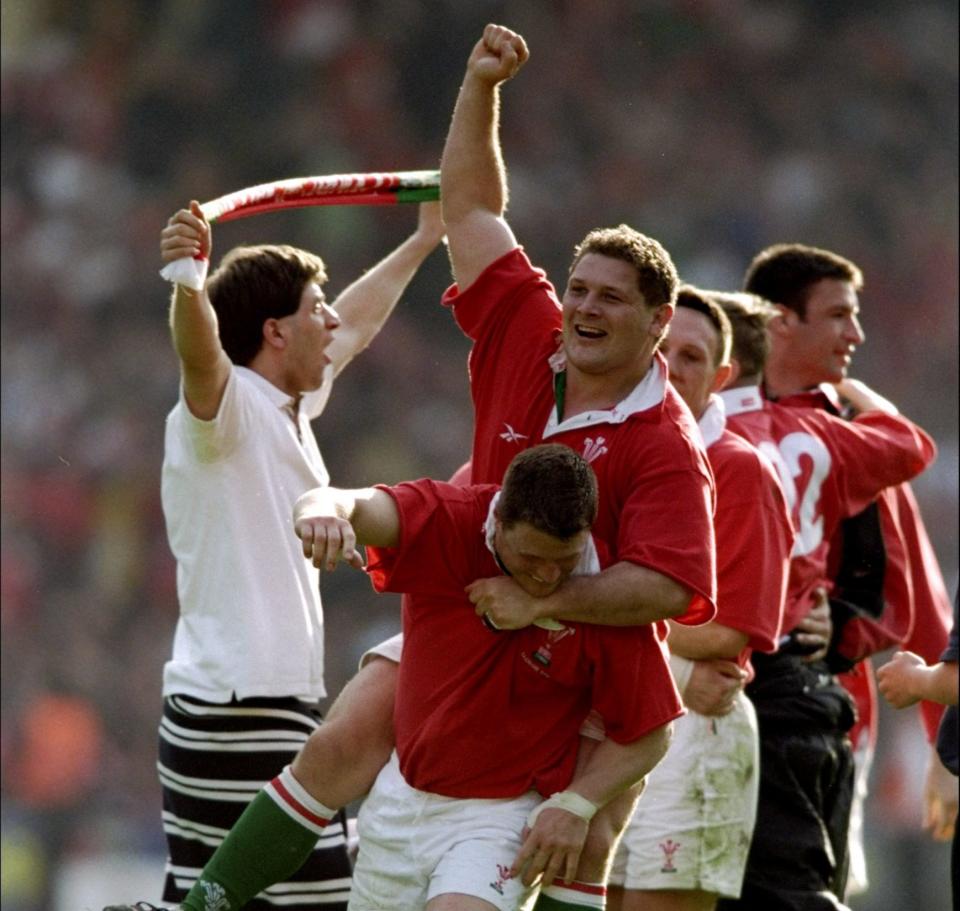
Wales’s Wembley win enshrined Telfer’s side into Scottish rugby immortality, a metaphor which Scotland have taken far too seriously since. Immortals the class of 1999 might be, but with no major title or no World Cup semi-final since, there is a sense that more could and should have been done to capitalise on that success. The talent is there and the class of 1999 are desperate to be ‘re-mortalised’.
KL: It’s embarrassing to be fair. The last four years we’ve looked like a much better team and the past two years we’ve looked like a side that could win a championship. We know we can beat England, France – Ireland are the bogey team – and Wales away from home is hard, but we shouldn’t be using playing away from Murrayfield as an excuse anymore. I don’t see why Scotland can’t be in the mix this year; it would be a shame if that team didn’t do something.
PB: I hope we’re not the last ever winners. Having France and England at home is always the year that Scotland do best. We have the players, one of the best coaches in the world, but the big challenge with Scottish rugby is the youngsters coming through. The under-20s are in the second division tournament and the professional playing structure... that’s what worries me.
GT: That 1999 group has a WhatsApp group which probably came around because of the illnesses of Doddie [Weir] and Tom [Smith]. We had a 20-year-reunion and we have plans to do something this year. Obviously the events were tragic, but they brought us together. Some of the best days I’ve had in the past five years have been coming together at events for Doddie and Tom. You just hope that it doesn’t require things like that. This year should be a happy occasion, though, remembering what happened 25 years ago.


 Yahoo Sport
Yahoo Sport 




































































